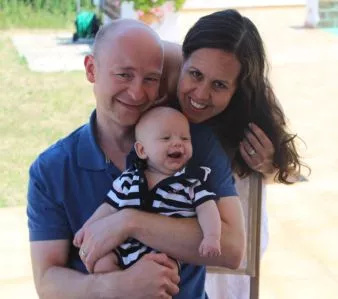World first pre-eclampsia test could save hundreds of babies
Monday 4 November 2013

The lives of hundreds of babies a year in the UK could be saved thanks to a rapid blood test that can accurately diagnose pre-eclampsia for the first time.
Researchers at Guy's and St Thomas' NHS Foundation Trust and King's College London have discovered that testing the level of a protein called placental growth factor (PlGF) in pregnant women before 35 weeks can accurately diagnose pre-eclampsia, a severe type of high blood pressure in pregnancy that is potentially fatal for the mother and baby.
The only cure for severe pre-eclampsia is to deliver the baby – regardless of how far advanced the pregnancy is.
Results of the study show that the PlGF blood test, which is done at the bedside and gives an accurate result in just 15 minutes, identifies 96% of women who will need to be delivered within the next 14 days.
Professor Andrew Shennan, consultant obstetrician at Guy's and St Thomas', says: "Around 1,000 babies die every year in the UK because of pre-eclampsia. With an accurate test, some of these babies could have been saved.
“The PlGF blood test means we can now decide with greater certainty if a mother should be closely monitored to see if the baby needs to be delivered early to save its life, or if it is safe to wait and allow the pregnancy to continue.
“It is uncommon for mothers to die from pre-eclampsia in the UK, but many can become seriously ill if the condition is not recognised. These cases can be avoided if the severity of the condition is detected – so this test will save lives.”
Currently, high blood pressure and the presence of protein in the urine are used to diagnose pre-eclampsia. Both of these signs can be unreliable and take days to confirm.
The research study shows that pregnant women who have a very low level of PlGF have severe pre-eclampsia, and the average time before they need to deliver their baby will be less than two weeks.
If a pregnant woman has a high level of PlGF, it is very unlikely that she has severe pre-eclampsia and will need to give birth in the next 14 days. Most of these women will carry their baby to full term.
Dr Lucy Chappell, clinical senior lecturer in obstetrics at King’s College London, and co-author of the study, says: “The PlGF test will allow us to identify these women who require closer monitoring, giving the right package of care to the right women.
“This research is going to change how we work and make a difference to thousands of women and babies who may be affected by pre-eclampsia. It is an extremely exciting development.”
Dr Chappell and Professor Shennan are now planning a trial across the UK and Ireland where the test results will be directly used to improve the care of pregnant women.
Pre-eclampsia affects one in ten pregnancies. Severe pre-eclampsia affects one in two in every 100 pregnancies.
The study, which was published today (Monday 4 November) in the American Heart Association journal Circulation, was jointly funded by baby charity Tommy's and Alere, who manufacture the Alere Triage PlGF test.
Jane Brewin, chief executive of Tommy’s, says: “Pre-eclampsia is one of the great unsolved problems of medical science and if it isn’t caught early enough, can in the worst cases lead to the death of both mother and baby. The only solution is to deliver the baby, sometimes at a point in pregnancy when babies will struggle to survive.
“This new test could revolutionise pre-eclampsia treatment so that it is spotted quickly, with greater accuracy, and women’s health managed so that their baby is only delivered when absolutely necessary - ultimately saving lives.”
Guy’s and St Thomas’ and King’s College London are part of King’s Health Partners Academic Health Sciences Centre (AHSC), a collaboration with King’s College Hospital and South London and Maudsley NHS Foundation Trusts.
Case study
Gemma Barrett, 32, from Kingston, was kept in hospital for more than a week being monitored for suspected pre-eclampsia. Her condition became serious and she had an emergency caesarean to deliver Sebastian, her first baby, at 33 weeks. Sebastian was not breathing when he was born and had to be resuscitated.
She says: “Being kept in hospital and monitored was very traumatic. I was uncertain about what was happening to me and my baby, as were the doctors. If this test had been available, doctors would have had confirmation that I would develop severe pre-eclampsia and my caesarean wouldn’t have been an emergency, which caused huge stress for me and my baby.
“I’m keen to have another baby, but know I’m likely to get pre-eclampsia again. This test would give me confidence that if I did have it, the doctors would know in advance if it was going to be a problem and treat me before it became an emergency.”
Last updated: March 2022
Contact us
If you're a journalist and have a media enquiry, please contact us.
Phone: 020 7188 5577
Email: [email protected]